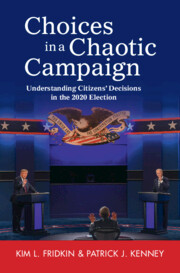Book contents
- Choices in a Chaotic Campaign
- Choices in a Chaotic Campaign
- Copyright page
- Dedication
- Contents
- Figures
- Tables
- Preface
- 1 Understanding How Campaigns Matter
- 2 “A Hot Mess inside a Dumpster Fire inside a Train Wreck”
- 3 The Priming of COVID-19 during the Campaign
- 4 Protests against Police Brutality
- 5 “A Rigged Election”
- 6 How the Campaign Shapes Voters’ Decisions about the Candidates
- 7 The Impact of Campaign Messages on the Decision to Vote
- 8 How Campaign 2020 Matters
- Appendix Survey Questionnaire
- References
- Index
7 - The Impact of Campaign Messages on the Decision to Vote
Published online by Cambridge University Press: 16 May 2024
- Choices in a Chaotic Campaign
- Choices in a Chaotic Campaign
- Copyright page
- Dedication
- Contents
- Figures
- Tables
- Preface
- 1 Understanding How Campaigns Matter
- 2 “A Hot Mess inside a Dumpster Fire inside a Train Wreck”
- 3 The Priming of COVID-19 during the Campaign
- 4 Protests against Police Brutality
- 5 “A Rigged Election”
- 6 How the Campaign Shapes Voters’ Decisions about the Candidates
- 7 The Impact of Campaign Messages on the Decision to Vote
- 8 How Campaign 2020 Matters
- Appendix Survey Questionnaire
- References
- Index
Summary
The citizen-centered theory of campaigns improves our understanding of participation in the 2020 election. In this chapter, we show that people who dislike conflict participate at a much higher rate than people who are more tolerant of conflict. We also show that people who watched the September presidential debate, people who have higher levels of confidence in the election results, and people with more polarized views of the social justice movement are significantly more likely to vote in the general election. The citizen-centered theory of campaigns also informs our understanding of convenience voting. People who are more sympathetic to Trump are more likely to heed his message of forgoing mail voting and going to the polls on Election Day. Further, people who dislike conflict are significantly more likely to rely on mail voting compared to voting on Election Day. Finally, views about the important issues of the campaign affect how people choose to cast a ballot; people who are more concerned about the COVID-19 pandemic and people with more confidence in the integrity of the election are more likely to vote by mail than in person on Election Day.
Keywords
- Type
- Chapter
- Information
- Choices in a Chaotic CampaignUnderstanding Citizens' Decisions in the 2020 Election, pp. 164 - 192Publisher: Cambridge University PressPrint publication year: 2024

